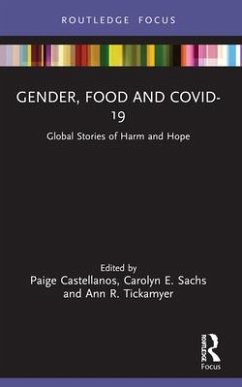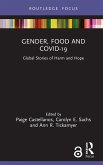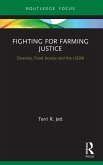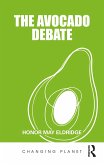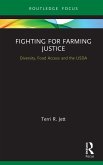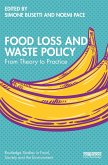Gender, Food and COVID-19
Global Stories of Harm and Hope
Herausgeber: Castellanos, Paige; Tickamyer, Ann R.; Sachs, Carolyn E.
Gender, Food and COVID-19
Global Stories of Harm and Hope
Herausgeber: Castellanos, Paige; Tickamyer, Ann R.; Sachs, Carolyn E.
- Broschiertes Buch
- Merkliste
- Auf die Merkliste
- Bewerten Bewerten
- Teilen
- Produkt teilen
- Produkterinnerung
- Produkterinnerung
This book documents how COVID-19 impacts gender, agriculture, and food systems across the globe with on-the-ground accounts and personal reflections from scholars, practitioners, and community members.
Andere Kunden interessierten sich auch für
![The Green Revolution The Green Revolution]() Patrick KilbyThe Green Revolution36,99 €
Patrick KilbyThe Green Revolution36,99 €![Gender, Food and COVID-19 Gender, Food and COVID-19]() Gender, Food and COVID-1968,99 €
Gender, Food and COVID-1968,99 €![Fighting for Farming Justice Fighting for Farming Justice]() Terri R. Jett (USA Butler University)Fighting for Farming Justice27,99 €
Terri R. Jett (USA Butler University)Fighting for Farming Justice27,99 €![The Avocado Debate The Avocado Debate]() Honor May EldridgeThe Avocado Debate19,99 €
Honor May EldridgeThe Avocado Debate19,99 €![Fighting for Farming Justice Fighting for Farming Justice]() Terri R. Jett (USA Butler University)Fighting for Farming Justice68,99 €
Terri R. Jett (USA Butler University)Fighting for Farming Justice68,99 €![Food Loss and Waste Policy Food Loss and Waste Policy]() Food Loss and Waste Policy39,99 €
Food Loss and Waste Policy39,99 €![Food Cultures and Geographical Indications in Norway Food Cultures and Geographical Indications in Norway]() Atle Wehn HegnesFood Cultures and Geographical Indications in Norway33,99 €
Atle Wehn HegnesFood Cultures and Geographical Indications in Norway33,99 €-
-
-
This book documents how COVID-19 impacts gender, agriculture, and food systems across the globe with on-the-ground accounts and personal reflections from scholars, practitioners, and community members.
Hinweis: Dieser Artikel kann nur an eine deutsche Lieferadresse ausgeliefert werden.
Hinweis: Dieser Artikel kann nur an eine deutsche Lieferadresse ausgeliefert werden.
Produktdetails
- Produktdetails
- Routledge Focus on Environment and Sustainability
- Verlag: Taylor & Francis Ltd
- Seitenzahl: 182
- Erscheinungstermin: 25. September 2023
- Englisch
- Abmessung: 216mm x 140mm x 10mm
- Gewicht: 232g
- ISBN-13: 9781032055992
- ISBN-10: 1032055995
- Artikelnr.: 68714001
- Herstellerkennzeichnung
- Libri GmbH
- Europaallee 1
- 36244 Bad Hersfeld
- gpsr@libri.de
- Routledge Focus on Environment and Sustainability
- Verlag: Taylor & Francis Ltd
- Seitenzahl: 182
- Erscheinungstermin: 25. September 2023
- Englisch
- Abmessung: 216mm x 140mm x 10mm
- Gewicht: 232g
- ISBN-13: 9781032055992
- ISBN-10: 1032055995
- Artikelnr.: 68714001
- Herstellerkennzeichnung
- Libri GmbH
- Europaallee 1
- 36244 Bad Hersfeld
- gpsr@libri.de
Paige Castellanos is currently an Assistant Research Professor at Pennsylvania State University, US, in Ag Sciences Global and Rural Sociology. She is the co-editor of the Routledge Handbook of Gender and Agriculture (Routledge, 2020). Carolyn E. Sachs is Professor Emerita of Rural Sociology and Women's, Gender, and Sexuality Studies at Pennsylvania State University, US. She is the co-editor of the Routledge Handbook of Gender and Agriculture (Routledge, 2020) and editor of Gender, Agriculture and Agrarian Transformations (Routledge, 2019). Ann R. Tickamyer is Professor Emerita of Rural Sociology and Demography at Pennsylvania State University, US. She is the author and editor of multiple books, including Rural Poverty in the United States (2017, with Jennifer Sherman and Jennifer Warlick).
Introduction Part 1. Food insecurity 1. COVID-19, gender, and small-scale
farming in Nepal 2. Gender implications of COVID-19 in Cambodia 3.
COVID-19, India, small-scale farmers, and indigenous Adivasi communities -
the answer to the future lies in going back to basics 4. Social aspects of
women's agribusiness in times of COVID-19 in the Central Highlands of
Vietnam Part 2. Care work in families, households, and communities 5.
Covid-19, gender, agriculture, and future research 6. Renegotiating care
from the local to global Part 3. Intersectional inequalities in the food
system 7. Facing COVID-19 in rural Honduras: experiences of an indigenous
women's association 8. Cultivating community resilience: working in
solidarity in and beyond crisis 9. COVID-19, migrant workers, and
meatpacking in US agriculture: a critical feminist reflection 10. Queerness
in the US agrifood system during COVID-19 11. Food corporation allegiance
or worker solidarity? Summoning restaurant worker solidarity in the age of
COVID-19 Part 4. Beyond COVID: moving forward with policy and research 12.
COVID-19 and feminist methods: one year later 13. The importance of
sex-disaggregated and gender data to a gender-inclusive COVID-19 response
in the aquatic food systems 14. In and out of place 15. Beyond COVID-19:
building the resilience of vulnerable communities in African food systems
Conclusion
farming in Nepal 2. Gender implications of COVID-19 in Cambodia 3.
COVID-19, India, small-scale farmers, and indigenous Adivasi communities -
the answer to the future lies in going back to basics 4. Social aspects of
women's agribusiness in times of COVID-19 in the Central Highlands of
Vietnam Part 2. Care work in families, households, and communities 5.
Covid-19, gender, agriculture, and future research 6. Renegotiating care
from the local to global Part 3. Intersectional inequalities in the food
system 7. Facing COVID-19 in rural Honduras: experiences of an indigenous
women's association 8. Cultivating community resilience: working in
solidarity in and beyond crisis 9. COVID-19, migrant workers, and
meatpacking in US agriculture: a critical feminist reflection 10. Queerness
in the US agrifood system during COVID-19 11. Food corporation allegiance
or worker solidarity? Summoning restaurant worker solidarity in the age of
COVID-19 Part 4. Beyond COVID: moving forward with policy and research 12.
COVID-19 and feminist methods: one year later 13. The importance of
sex-disaggregated and gender data to a gender-inclusive COVID-19 response
in the aquatic food systems 14. In and out of place 15. Beyond COVID-19:
building the resilience of vulnerable communities in African food systems
Conclusion
Introduction Part 1. Food insecurity 1. COVID-19, gender, and small-scale
farming in Nepal 2. Gender implications of COVID-19 in Cambodia 3.
COVID-19, India, small-scale farmers, and indigenous Adivasi communities -
the answer to the future lies in going back to basics 4. Social aspects of
women's agribusiness in times of COVID-19 in the Central Highlands of
Vietnam Part 2. Care work in families, households, and communities 5.
Covid-19, gender, agriculture, and future research 6. Renegotiating care
from the local to global Part 3. Intersectional inequalities in the food
system 7. Facing COVID-19 in rural Honduras: experiences of an indigenous
women's association 8. Cultivating community resilience: working in
solidarity in and beyond crisis 9. COVID-19, migrant workers, and
meatpacking in US agriculture: a critical feminist reflection 10. Queerness
in the US agrifood system during COVID-19 11. Food corporation allegiance
or worker solidarity? Summoning restaurant worker solidarity in the age of
COVID-19 Part 4. Beyond COVID: moving forward with policy and research 12.
COVID-19 and feminist methods: one year later 13. The importance of
sex-disaggregated and gender data to a gender-inclusive COVID-19 response
in the aquatic food systems 14. In and out of place 15. Beyond COVID-19:
building the resilience of vulnerable communities in African food systems
Conclusion
farming in Nepal 2. Gender implications of COVID-19 in Cambodia 3.
COVID-19, India, small-scale farmers, and indigenous Adivasi communities -
the answer to the future lies in going back to basics 4. Social aspects of
women's agribusiness in times of COVID-19 in the Central Highlands of
Vietnam Part 2. Care work in families, households, and communities 5.
Covid-19, gender, agriculture, and future research 6. Renegotiating care
from the local to global Part 3. Intersectional inequalities in the food
system 7. Facing COVID-19 in rural Honduras: experiences of an indigenous
women's association 8. Cultivating community resilience: working in
solidarity in and beyond crisis 9. COVID-19, migrant workers, and
meatpacking in US agriculture: a critical feminist reflection 10. Queerness
in the US agrifood system during COVID-19 11. Food corporation allegiance
or worker solidarity? Summoning restaurant worker solidarity in the age of
COVID-19 Part 4. Beyond COVID: moving forward with policy and research 12.
COVID-19 and feminist methods: one year later 13. The importance of
sex-disaggregated and gender data to a gender-inclusive COVID-19 response
in the aquatic food systems 14. In and out of place 15. Beyond COVID-19:
building the resilience of vulnerable communities in African food systems
Conclusion

